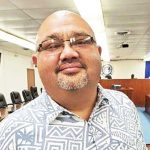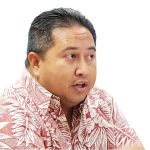‘Kanoa stunt won’t happen again’
The CNMI COVID-19 Task Force is finalizing its report on the incident involving a man who fled quarantine at Kanoa Resort last Oct. 17, with task force chair Warren Villagomez assuring in a radio news briefing last Friday that the incident won’t happen again.
Speaking at the same news briefing, Gov. Ralph DLG Torres said that, although the pandemic protocols have been in place for two years now, it continues to be a learning process and is being tweaked as the situation demands.
In response to a question during the radio briefing on how David Butterfield managed to run away from the quarantine site last Oct. 17, Villagomez said they are doing what they can to gather all the evidence in this case. Villagomez said he and others have been reviewing evidence of Butterfield walking out of Kanoa, and said it is his and the task force’s focus to build and maintain trust within the community.

Villagomez
“We’re doing everything we can to [compile] the evidence. …We want to build confidence within our community and within our guests, so if [an] individual does not respect the [quarantine] process we need to [be] swift and make changes in our action,” said Villagomez.
Butterfield was arrested last Oct. 18 on charges of obstruction of justice and public nuisance. He was returned to the quarantine site after being booked and detained. Saipan Tribune learned that Butterfield was subsequently released last week after completing his quarantine.
Villagomez said the Department of Public Safety is investigating the case and that Attorney General Edward Manibusan and Chief Prosecutor Chester Hinds are aware of the case.
“Things are in motion,” Villagomez said.
He said through the AG revision of the governor’s directive on pandemic protocols, there is a penalty for anyone violating the public health measures. He said these measures are general and that includes arrivals, following all the protocols as well as leaving quarantine sites. Villagomez said quarantine violators face a penalty is $500 and could also be jailed, depending on the severity of the violation.
Villagomez stressed that they are not complacent and described Butterfield’s case as an isolated incident. “I can assure you it’s not going to happen again. But if it happens, tough measures are going to be coming to the individual,” he added.
At the same press briefing, Torres noted that his COVID-19 directive has undergone changes since the beginning of the pandemic. He cited as an example alcohol, which was never part of the directive, as consuming beverages can affect passengers or returning residents. At the start, he said, they had several instances where alcohol was brought into the quarantine room and the individuals created damage in the room.
“So we had to change that protocol,” he said, adding that there were certain times they had to adjust what works.

Torres
Torres assured the public that the task force has made adjustments to make it safer for the community. “At the end of the day, everyone that comes here, just follow through the protocol and we won’t be adjusting things or making it stricter for others that come into CNMI. But again, safety for our community is our priority,” he said.
In explaining the CNMI’s approach to containing the spread of COVID-19, and why the protocols are as such, Commonwealth Healthcare Corp. chief executive officer Esther Muña said the Centers for Disease Control and Prevention and CHCC itself are continuing to get “a better picture of transmissibility among the vaccinated and the unvaccinated.”
“What we are operating here [are] public health prevention measures before treatment. Testing, quarantine, and isolation are keys to reducing risks for this community who are now enjoying a safe environment, sports activities, and family gatherings. The quarantine protocols we implement are [focused on] the reduction of risk and do not eliminate the entire risk. …A traveler who returns to the CNMI is putting this community at risk,” said Muña.
As more data is collected and breakthrough cases are being researched, the CDC and CHCC are confident in saying that there is a reduced risk of spreading COVID-19 in fully vaccinated travelers versus unvaccinated travelers. In all cases, however, Muña said the risk of spread is not removed entirely.
“We are confident that risk is reduced when a fully vaccinated individual returns versus one who is not vaccinated. A prior infection with vaccination is a lower risk, but not an elimination of risk, so I just wanted to clarify that,” Muña added.
Villagomez and Muña both confirmed last Friday that Butterfield completed his 10th and final day of quarantine on Oct. 22. (with JOSHUA SANTOS)























